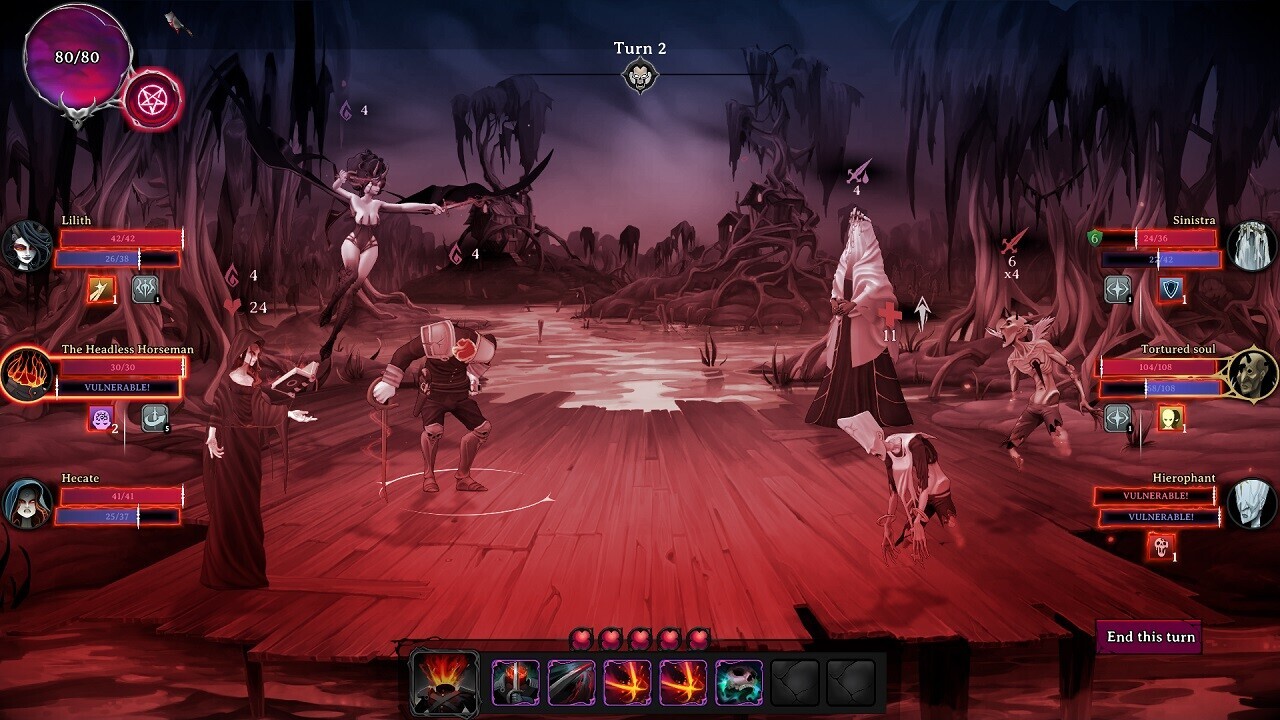
As a technology journalist I spend a lot of my time playing devil’s advocate. When a game comes along that gives me the opportunity to take on the role of The Devil themselves, I consider it a rare privilege.
Rogue Lords is a turn-based, rogue-like, procedural-generated, party building game that puts you in the shoes of the Devil. You’re tasked with reclaiming your evil glory and taking on none other than the likes of Van Helsing and their legion of demon hunters.
You’ll be aided in your quest by various recruitable evil personas from lore and history including Dracula, the Headless Horseman, Doctor Frankenstein and their monster, Bloody Mary, the White Lady, Lilith, Hecate, and Baron Samedi.
The Good
There’s a lot to like here. The graphics are crisp, clean, and compelling and the game moves along swiftly. I never found myself staring at loading screens for more than a few seconds.
The actual gameplay itself is something that I imagine will be quite polarizing. Rogue Lords isn’t the toughest rogue-like I’ve played but it might be the most complex one.
Once you’ve completed the tutorial, you’ll start your first real run through. The game’s presented as a book where you’ll access new “chapters” as you go. Basically, each chapter is a little tougher than the last and, as this is a rogue-like, you’re expected to lose and have to start over a lot.
The big hook to Rogue Lords is that you’re the devil, so not only do your disciples (the characters you use in combat) have their own powers, but so do you. You can “cheat” by entering “Devil mode” and changing various aspects of the game status to suit your desires.

For example, if one of your disciples has been afflicted by an ailment that causes them to deal reduced damage, you can simply drag the icon for that ailment from beneath their name and place it under and enemy’s. Now the enemy has that ailment and your character’s fine.
You can restore abilities that have been expended and even lower an enemy’s health gauges to zero. But these abilities come at a cost in the form of your overall spirit points. Once these are depleted, your run comes to an end and you’ll have to start from the beginning of the book in your next playthrough.
What’s interesting about the whole you’re the Devil perspective is that you’re not playing as a party of evil adventurers. You have three characters but you don’t have to use them during each turn in combat.
This is handy because there are actually two types of damage: physical and spiritual. If either reaches zero, the disciple or enemy whose bar has been depleted is in a “vulnerable” state and can be finished off with additional damage of the same type.

So, for example, you may have one character that’s great at dealing physical damage and another that specializes in spiritual. If you’re dealing with an enemy that has a low physical damage threshold, you’ll want to attack with your disciple who does best at that damage category.
In Rogue Lords, you don’t use the typical trope where each character takes a turn. Instead, as the Devil, you have a number of action points you can spend on any character’s skills you choose. This means, if you have enough available skills, you can spend all your points making a single disciple act.
Each disciple has a number of skills that can be unlocked, purchased, upgraded, and swapped out. And each skill typically has to be “replenished” once its been used. This replenishment is another kind of character action unique to each disciple.
Complicating matters further, each disciple can gain or lose permanent or temporary traits and attributes, and there are relics of varying power to be found throughout the game that can modify how disciples or the Devil’s powers work.
Did I mention there were also randomly-generated boosts that affect different paths of the randomly-generated maps that can have huge effects on the difficulty of combat and how you’ll want to organize your three-disciple team?
Rogue Lords is loaded with systems and, once you get used to them, they actually work out pretty cool.
It can feel a bit gonzo for the first couple of hours but eventually the gameplay opens up and it starts to feel like there are an endless number of ways you could accomplish a run, and none of them are necessarily right or wrong.

That’s when Rogue Lords shines and you can really see where the developers’ skills and passion come through.
But there are some problems.
The bad
The tutorial is almost useless. It showed me how to move and what to click on in order to select the next activity or advance in a battle. But it taught me nothing and, worse, it committed the sin of slinging a dozen or more concepts at me in the space of a few minutes.
It did a really crappy job of making me care about the world I was in and an even crappier one of preparing me to make the strategic choices necessary to succeed in even the most basic of battles.
The tutorial takes you through a fair amount of character progression requiring you to make numerous choices about how your disciples grow in power. And then it tosses you into an unwinnable fight without ceremony.
I think the point of the fight was to show you that Rogue Lords is a rogue-like and you’re supposed to lose a lot. But that point is seriously undermined by the fact that all the progression you fought for in the tutorial is stripped away and you’re essentially just starting a new save file once it ends.
The game also falls short in the audio and writing departments. There’s a persistent scratching ambient sound that I think is supposed to be a pencil writing on dry paper, but it was just irksome to me.
And the story and writing aren’t necessarily bad, but they suffer from the same problem that Magic: The Gathering does when people try to put it in video game form. There’s just so many rules and layers of strategy that the “flavor” text sort of fades into the background.
As much as I want to love the premise of recruiting legendary evil-doers to reclaim the darkness, it’s all presented with the aplomb of a dungeon master who’s already started rolling initiative checks.
I had no clue what the catalyst for my first disciple unlock was nor who they were or why they were joining me.
The verdict
All that bad aside, Leikir Studio and Cyanide Studio have done something awesome with Rogue Lords. It’s not just Slay The Spire or another popular rogue-like reskinned. This game is an evolution of the genre.
For such a seemingly simple concept, the gameplay is incredibly deep. I loved learning new strategies and trying new ways of dealing with enemies. Rogue Lords takes the “deal damage, drink potions, and wait for abilities to charge” trope and spits in its eye.
It takes some serious game dev chops to give players a mechanic that lets them lower an enemy’s health guage to zero without it affecting the overall challenge and playability of the game.
Another thing I loved about the game was that I never felt like it was intentionally weighing me down or pumping up the enemies in order to provide artificial challenge.
I never felt like I needed to optimize a run through in order to compete with a boss. I felt like making smart tactical and strategic decisions played a bigger role in my successful runs than luck did. And, if you ask me, that’s huge.
Rogue Lords is a giant step in the right direction for the future of the rogue-like genre.
Get the TNW newsletter
Get the most important tech news in your inbox each week.




